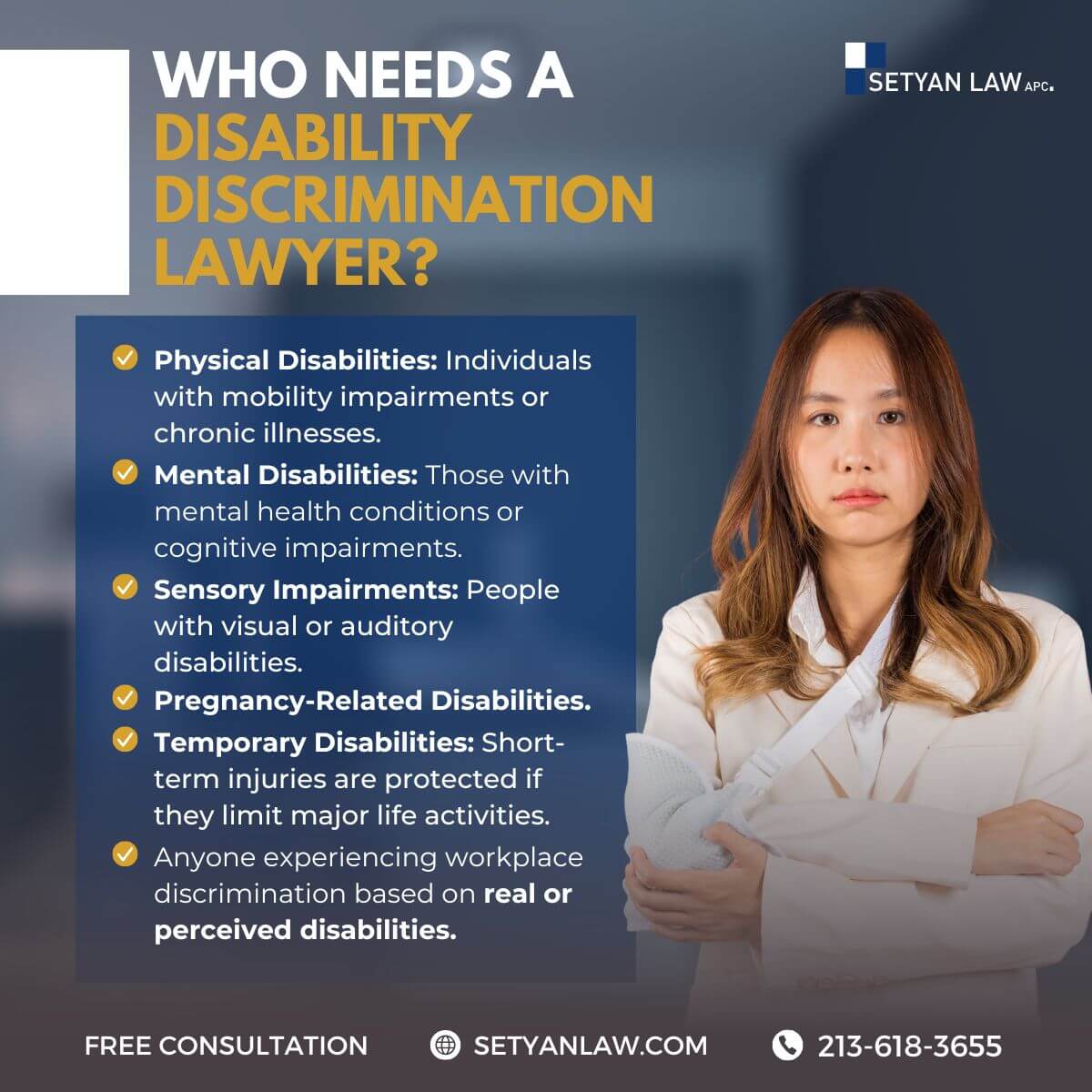Updated November 21, 2025
Why Undue Hardship Claims Fail in California Courts (2026 Update)
Did you know that nearly 70% of employer “undue hardship” defenses fail when challenged in California courts? Employers frequently misunderstand what truly constitutes undue hardship under California law, leading to improper denials of reasonable accommodations for employees with disabilities.
Despite California’s robust employee protections, many employers continue to reject accommodation requests by claiming financial or operational burdens that don’t meet the legal standard. The California Fair Employment and Housing Act (FEHA) sets a significantly higher bar for proving undue hardship than federal law, specifically requiring employers to demonstrate “significant difficulty or expense” when denying accommodations.
What makes these claims particularly problematic is that employers often fail to conduct proper analyzes or maintain adequate documentation to support their position. Furthermore, many organizations make critical procedural mistakes during the interactive process that undermine their undue hardship defense before it even reaches the courtroom.
This comprehensive guide examines why undue hardship claims consistently fail in California courts, particularly with recent judicial interpretations through 2025. Additionally, we’ll explore the documentation requirements courts expect, common employer missteps, and the legal remedies available when accommodations are improperly denied. Whether you’re an employee facing accommodation issues or an employer seeking to understand your legal obligations, understanding these failures is essential to navigating California’s disability accommodation landscape.
Legal Definition of Undue Hardship in California
California employers facing disability accommodation requests must understand the specific legal definition of undue hardship before denying such requests. The concept goes far beyond mere inconvenience or nominal costs, requiring substantial evidence to justify rejection of an accommodation.
California Government Code §12926(u) Overview
California law precisely defines undue hardship as “an action requiring significant difficulty or expense” [1]. This definition appears straightforward but contains nuanced requirements that many employers misinterpret. Government Code §12926(u) establishes five specific factors courts examine when evaluating undue hardship claims:
The nature and cost of the accommodation needed
The overall financial resources of the facilities involved, number of persons employed at the facility, and the effect on expenses, resources, or operations
The overall financial resources, size, number of employees, and facility locations of the covered entity
The type of operations, including composition, structure, and functions of the workforce
The geographic separateness or administrative/fiscal relationship between facilities
Importantly, the determination of undue hardship requires “a multi-faceted, fact-intensive inquiry” [2] conducted on a case-by-case basis. Employers cannot rely on generalized claims but must present specific evidence related to their unique circumstances.
Distinction Between Inconvenience and Legal Hardship
Many employers fail in court because they confuse inconvenience with legal hardship. The threshold for establishing undue hardship in California is intentionally high [3], ensuring employers cannot easily evade accommodation responsibilities.
Simply claiming something is “too expensive” or “inconvenient” [3] will never suffice as a defense. Similarly, employers cannot merely assert economic reasons without demonstrating “why and how asserted economic reasons would affect their ability to provide a particular accommodation” [2].
Courts require evidence that accommodations would be “extremely costly, extensive, substantial or disruptive, or cause a fundamental change in the goods or services provided” [4]. Minor adjustments or manageable expenses cannot constitute undue hardship regardless of an employer’s preference not to make changes.
In practice, this means smaller businesses might establish undue hardship for a $5,000 accommodation while larger corporations cannot [5]. The assessment considers relative impact rather than absolute cost.
Comparison with Federal ADA Standards
While both California’s FEHA and the federal Americans with Disabilities Act (ADA) require employers to provide reasonable accommodations unless doing so would cause undue hardship, California’s standards offer stronger employee protections.
Under FEHA, employers with five or more employees must provide reasonable accommodation [6], whereas federal standards typically apply to larger employers. Moreover, California law explicitly makes failing to engage in a timely, good faith interactive process unlawful in itself [6], regardless of whether an accommodation would constitute undue hardship.
California courts interpret undue hardship more stringently than federal courts, placing greater emphasis on documentation and proof. As noted in Atkins v. City of Los Angeles, employers “must do more than simply assert economic reasons” [2] and must provide concrete evidence of hardship.
Unlike federal standards, which may give more weight to employer concerns about operational changes, California courts typically require comprehensive proof that accommodations would significantly impede business functions or impose unreasonable costs in the specific context of the employer’s operations.
The practical effect is that California employers face a substantially higher burden of proof when claiming undue hardship, explaining why approximately 70% of such defenses ultimately fail in court.
Common Employer Missteps in Undue Hardship Claims
Employers frequently undermine their undue hardship defense through procedural mistakes that violate California’s Fair Employment and Housing Act (FEHA). These errors often prove fatal to their legal position, even before courts examine the substantive merits of accommodation requests.
Failure to Engage in the Interactive Process
Under California law, employers must initiate a timely, good-faith interactive process when an employee requests reasonable accommodations or when the employer becomes aware of a potential need [6]. This obligation exists independently of whether an accommodation ultimately causes undue hardship. Indeed, refusing to engage in this process constitutes a separate violation that can trigger liability [7].
The interactive process requires:
Prompt acknowledgment of accommodation requests
Collaborative dialog exploring potential solutions
Individualized assessment of both job requirements and specific limitations
Documentation of all interactions and decisions made
This process cannot be outsourced or delegated. For instance, relying solely on communications with workers’ compensation carriers without directly contacting the employee violates this obligation [8]. Consequently, even employers with legitimate hardship concerns must first exhaust the interactive process in good faith [9].
Use of Blanket ‘100% Healed’ Return-to-Work Policies
Policies requiring employees to be “100% healed” or free from all medical restrictions before returning to work are patently unlawful under California law [1]. These policies effectively deny employees their right to individualized assessment and reasonable accommodation.
In one notable case, a school district required a custodian to demonstrate “maximal force” capabilities after an on-the-job injury—essentially demanding complete recovery before return. This inappropriate standard resulted in a $290,000 settlement after investigation by California’s Department of Fair Employment and Housing [10].
Essentially, these policies circumvent the interactive process by implementing a one-size-fits-all standard. Employees recovering from injuries or managing disabilities have the right to return with restrictions that can be reasonably accommodated, unless the employer can prove specific undue hardship [11].
Ignoring Alternative Accommodations
California law mandates that employers consider “any and all reasonable accommodations” for an employee’s disability except those creating genuine undue hardship [1]. Nonetheless, many employers erroneously limit their consideration to only the specific accommodation requested by the employee.
Courts view unexplained rejection of feasible alternatives as strong evidence of discrimination rather than legitimate hardship concerns. Although employers aren’t required to create new positions or eliminate essential job functions [8], they must explore options including:
Job restructuring or modified duties
Reassignment to vacant positions
Paid or unpaid leave
Modified work schedules
Reasonable equipment modifications
Failing to document consideration of these alternatives fundamentally weakens an undue hardship defense. The burden falls on the employer to demonstrate why each potential accommodation would cause significant difficulty or expense [9].
Importantly, temporary accommodations don’t necessarily establish precedent for permanent ones. However, employers who provide short-term accommodations then discontinue them face heightened scrutiny and must explain why continuation would suddenly constitute undue hardship [8].
By avoiding these common missteps, employers can strengthen their undue hardship defenses and better fulfill their legal obligations under California’s disability accommodation laws.
Documentation Gaps That Undermine Employer Defenses
Documentation serves as the cornerstone of successful undue hardship defenses in California courts. Many employers lose accommodation cases not because their hardship claims lack merit, but because they fail to properly document their analysis and decisions.
Lack of Written Undue Hardship Analysis
Courts require employers to present specific, detailed documentation supporting their undue hardship claims. General concerns or verbal assertions without supporting analysis rarely withstand judicial scrutiny. In fact, employers must perform an individualized assessment considering all relevant factors listed in California Government Code §12926(u), not just cost considerations.
Documentation gaps often become apparent when employees request written explanations for accommodation denials. Prudent employees immediately request detailed written explanations citing specific costs, operational impacts, and safety concerns considered by their employer. This request serves dual purposes: helping employees evaluate the claim’s merit and providing crucial evidence if litigation becomes necessary.
Missing Cost-Benefit Evaluations
Ironically, many employers mistakenly focus on cost-benefit analyzes that courts actually reject. Neither the statutory language nor legislative history supports evaluating accommodations based on perceived benefits versus costs. Instead, courts examine whether the accommodation would cause “significant difficulty or expense” relative to the employer’s resources and operations.
The determination of undue hardship depends on the employer’s resources, not on the individual employee’s salary, position, or status. Yet employers often incorrectly assume that accommodations for part-time or temporary workers justify less investment, a position courts have repeatedly rejected.
Failure to Provide Financial Evidence
Financial claims without supporting documentation represent perhaps the most common documentation gap. Employers asserting financial hardship must provide:
Itemized costs for the specific accommodation
Comparative analysis against departmental and organizational budgets
Profit and loss statements demonstrating financial impact
Cash flow projections showing resource limitations
Documentation of efforts to secure external funding or tax benefits
Vague statements like “it’s too expensive” or “we can’t afford it” inevitably fail legal scrutiny. Courts expect concrete numbers and thorough financial analysis to justify denials.
Likewise, operational impact claims require measurable, objective evidence of disruption. Without detailed workflow analyzes, productivity metrics, or time studies demonstrating delays, subjective complaints from managers hold little weight.
This documentation burden falls especially heavily on larger corporations. As noted in case law, organizations with substantial resources and numerous employees face heightened scrutiny when claiming hardship, as courts expect their greater capacity to absorb accommodation costs and workflow adjustments.
Judicial Scrutiny and Burden of Proof on Employers
The burden of proving undue hardship in California courts falls entirely on the employer, creating a substantial legal hurdle that many organizations fail to overcome. Courts apply rigorous scrutiny to these claims, requiring far more than mere assertions or generalizations about operational impacts.
What Courts Require as Proof of Hardship
California courts demand employers show “why and how asserted economic reasons would affect their ability to provide a particular accommodation” [12]. This standard requires specific, documented evidence rather than hypothetical concerns. According to established precedents, employers must demonstrate that accommodations would create “significant difficulty or expense” through concrete operational and financial evidence [9].
Courts conduct what’s described as a “multi-faceted, fact-intensive inquiry” evaluated on a case-by-case basis [9]. This examination considers factors such as:
Cost relative to the employer’s resources
Impact on facility operations and other employees
Business structure and workforce composition
Administrative relationships between facilities
Merely claiming financial constraints without supporting documentation invariably fails. As established in Atkins v. City of Los Angeles, employers “must do more than simply assert economic reasons” [9].
Case Law Trends in 2023–2025
Recent judicial decisions have further strengthened the scrutiny applied to undue hardship claims. Notably, the 2023 Groff v. DeJoy decision rejected the previously lower “de minimis cost” threshold for religious accommodations, requiring proof that burdens are “substantial in the overall context of an employer’s business” [13].
Though initially addressing religious accommodations under Title VII, this higher standard has influenced California courts’ approach to disability accommodations as well. Therefore, successful undue hardship claims increasingly require proving “substantial increased costs in relation to the conduct of [the] particular business” [14].
Furthermore, courts now expressly reject claims based solely on coworker impacts unless those impacts “affect the conduct of the business” [14]. Judicial scrutiny also extends to considering whether employers explored alternative accommodations before claiming hardship [13].
Why Large Employers Struggle to Prove Hardship
Large corporations face an inherently higher threshold to demonstrate undue hardship [12]. Courts consider their greater financial resources, multiple facilities, and staffing flexibility when evaluating accommodation costs.
Hence, accommodations that might constitute genuine hardship for small businesses often represent manageable expenses for larger organizations. Courts explicitly evaluate the employer’s “overall financial resources” and “overall size of the business” when assessing hardship claims [9].
Accordingly, large employers frequently find their size becomes a liability when defending accommodation denials. The statutory definition explicitly scales the hardship standard to the employer’s resources, creating a proportional test where larger organizations must show correspondingly greater impact to establish undue hardship [1].
Legal Remedies When Undue Hardship Is Misused
When employers misuse undue hardship claims to deny reasonable accommodations, employees have specific legal remedies available. Understanding these options empowers individuals facing discrimination to take appropriate action.
Filing a FEHA-Based Discrimination Claim
Employees who believe their employer falsely claimed undue hardship must act promptly. In California, you generally have three years from the date of the discriminatory act to file a complaint with the California Department of Fair Employment and Housing (DFEH). This extended timeline, effective since January 1, 2020, replaced the previous one-year limit [2]. For federal claims through the Equal Employment Opportunity Commission (EEOC), the standard deadline is typically 300 days from the discriminatory incident [2].
To initiate a claim, you must submit detailed information about your case, including evidence that your employer:
Refused to consider your request without discussion
Claimed accommodations aren’t provided as policy
Terminated or demoted you after requesting accommodation
Falsely claimed undue hardship without proper analysis [15]
Role of the DFEH and EEOC in Investigations
Following a filed complaint, the DFEH or EEOC will launch an investigation into your case [2]. This process typically involves:
Interviewing witnesses and gathering statements
Reviewing employer documentation and policies
Examining financial records and accommodation analyzes
Working with your employer to resolve the issue [2]
Both agencies enforce laws against workplace discrimination, yet they differ in jurisdiction and approach. The DFEH handles violations of California’s FEHA, offering broader protections than federal law [2]. Subsequently, the agency may attempt resolution through conciliation or refer cases to their Dispute Resolution Division when appropriate [16].
Compensation for Denied Accommodations
Successful claims against improperly denied accommodations can yield various remedies, chiefly:
Economic Damages – Including back pay, front pay for future wages, and out-of-pocket expenses [12]
Non-Economic Damages – Compensation for emotional distress, anxiety, depression, and humiliation with no statutory cap in California [12]
Additional Remedies – Policy changes, training requirements, reasonable accommodations, and potentially civil penalties [16]
Given these potential remedies, consulting an experienced employment attorney becomes valuable. They can help navigate complex legal requirements, gather necessary evidence, and advocate effectively for your rights throughout the process [3].
Conclusion
Understanding the strict requirements for establishing undue hardship claims stands essential for both employers and employees navigating disability accommodations in California. California courts consistently reject inadequate hardship defenses because employers fail to meet the significantly higher legal standards compared to federal law.
The 70% failure rate of these claims stems primarily from three critical shortcomings. First, many employers confuse mere inconvenience with legal hardship, neglecting the “significant difficulty or expense” threshold required by Government Code §12926(u). Second, procedural failures during the interactive process often doom employer defenses before substantive considerations even begin. Third, documentation gaps leave employers unable to substantiate their claims with concrete evidence.
Consequently, organizations must thoroughly document their undue hardship analyzes, including detailed financial impacts, operational disruptions, and consideration of alternative accommodations. Large employers face particularly stringent scrutiny due to their presumed greater capacity to absorb accommodation costs.
Employees denied reasonable accommodations based on questionable hardship claims should recognize their substantial legal protections. Filing complaints with the California Department of Fair Employment and Housing within the three-year statutory period can lead to economic damages, emotional distress compensation, and mandated workplace policy changes.
Undoubtedly, California law places the burden of proving undue hardship squarely on employers. This protective framework ensures disability accommodations remain a right rather than a privilege, requiring organizations to demonstrate genuine inability rather than mere unwillingness to accommodate. Therefore, employers must approach accommodation requests with thorough analysis and documentation, while employees should remain vigilant about their rights when facing accommodation denials based on alleged hardship.
It’s always best to consult a qualified Medical Condition Discrimination Attorney regarding your case before you file. Employment law has many pitfalls and an attorney can help you navigate past them safely. Sam Setyan will review your grievance, tell you your options, and guide you to the most favorable outcome possible. It’s your call.
Call 213-618-3655 for a free consultation.
Call Setyan Law at (213)-618-3655 to schedule a free consultation.







